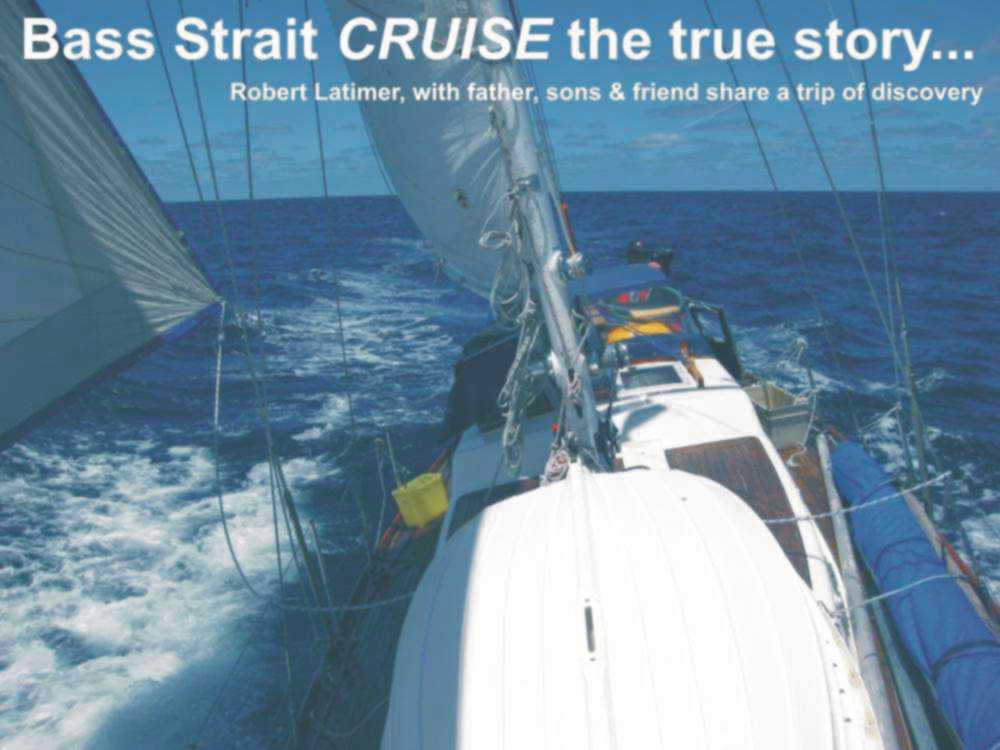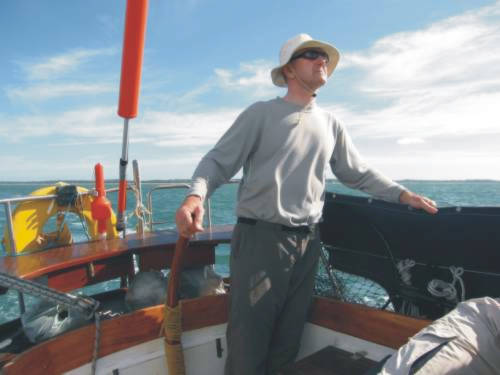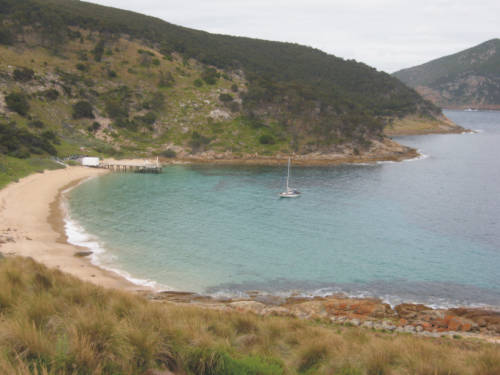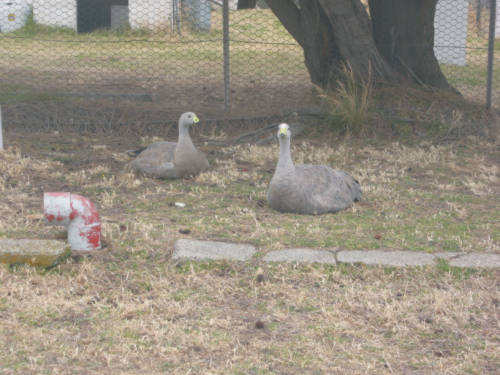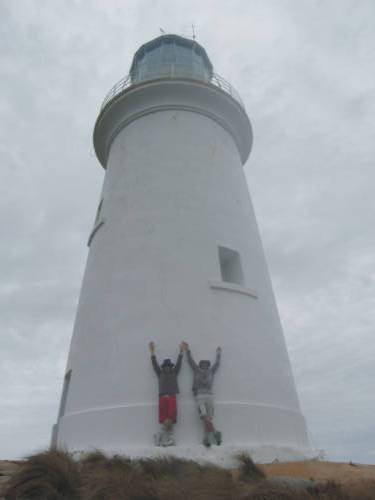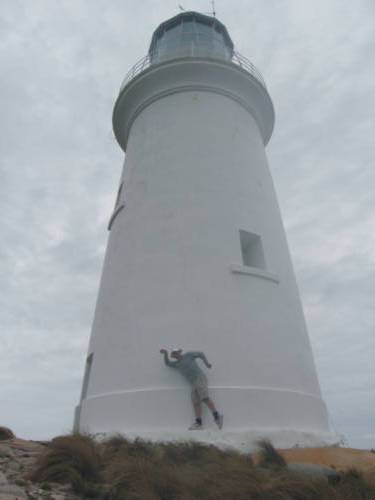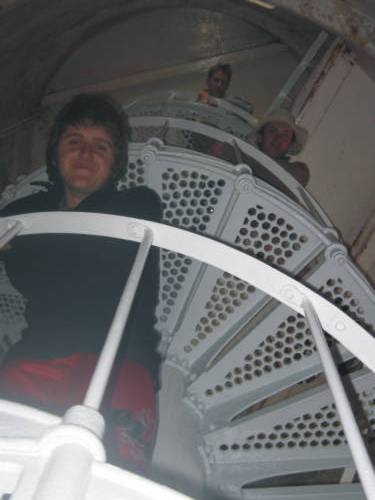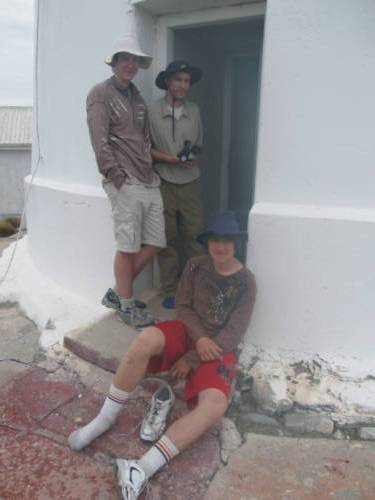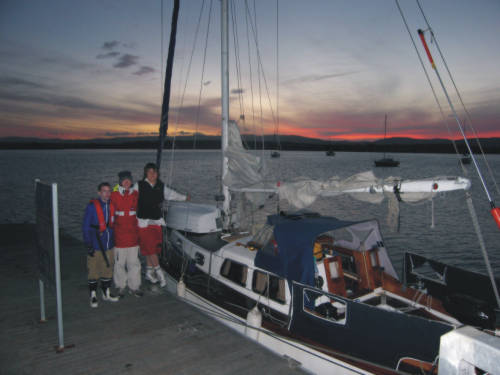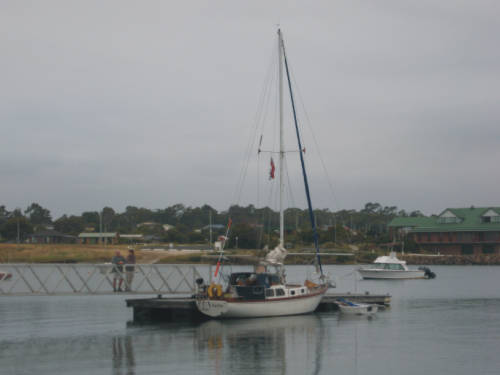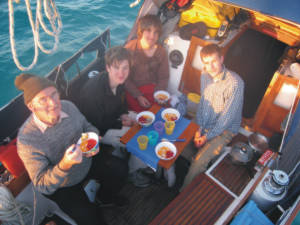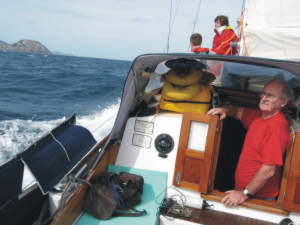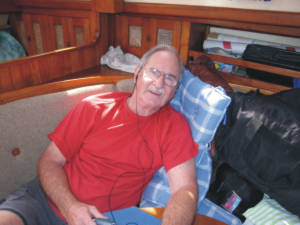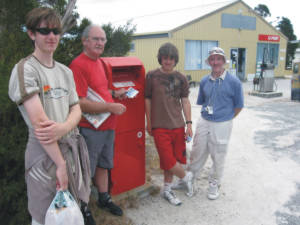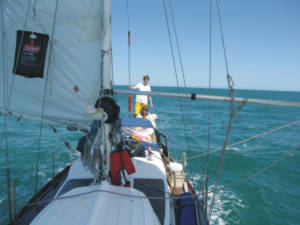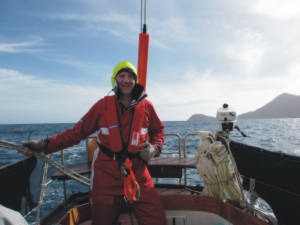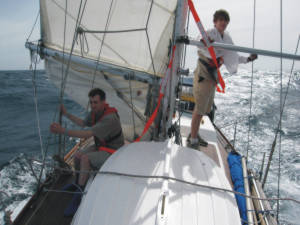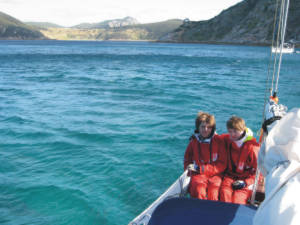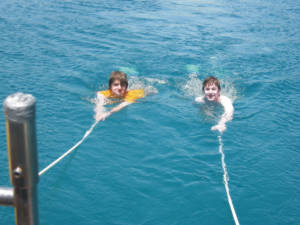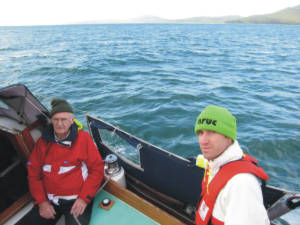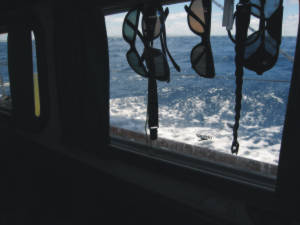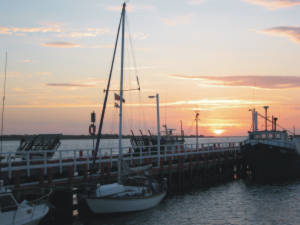|
Summer In Bass Strait
At the best of times, the weather in Bass Strait is changeable.
At the worst of times, well, words hardly seem adequate. Just
think Sydney-Hobart yacht race and thoughts of endurance and
survival immediately spring to mind. (Although this probably
has more to do with modern boat design than anything Mother Nature
might dish up).
To make things worse, of all the months in the year, December
and January take the prize for maximum changeable-ness; a cruel
twist of fate, since it's also the time when I take my annual
holidays.
Starting Out
So it was that on the 27th December 2005, after what seemed like
years of preparation, anticipation and expense, we finally guided
Tee Pee out of the safe confines of the Yaringa marina in Westernport
to begin her 17 day Bass Strait adventure. On board were my two
sons, Matt (19), James (15), father Bill (77) and friend Evan
(30).
Five people for a day-sail is one thing. But five people, plus
gear, food and provisions for an extended cruise, is quite another.
In our case, being mostly family, we were all well aware of each
other's bad habits in advance and embraced the challenge of remaining
friends.
Course Of Adventure
Our initial plan was to make our way under the Phillip Island
bridge, (something we can do at low tide with 1.5m to spare)
then southeast to Refuge Cove on Wilson's Promontory, followed
by a northerly diversion to Port Welshpool, where we planned
to celebrate New Years eve. After this it was to be a case of
island-hopping south, through the Kent & Furneaux Groups,
returning via George Town on the Tamar River. (near Launceston)
As the sun set on our first night afloat, we sat at anchor behind
Cape Woolami, (on Phillip Island - home of the ever-popular,
nightly penguin parade) excitedly discussing the plans and possibilities
before us, while packing away the last of the gear. Will we get
away tonight as planned? Is the gale warning and the forecast
of a south-westerly bluster going to change anything? Should
I have eaten that extra helping of spaghetti? How will I handle
a night watch on the helm?
In the end, the uncertainly surrounding the weather caused us
to defer our departure, as we opted instead to sit at anchor
and wait for the change to come through, rather than facing it
out at sea. We didn't have long to wait. By 5:00am the next morning
the wind shifted through NW to SW and began blowing at 25-35kts.
Beyond our sheltered anchorage, seas were beginning to rise 3-5m,
with conditions predicted to abate later in the day.
For us, a window of opportunity had opened and it was time to
jump through. But not before inserting a double reef in the main
and trimming the headsail back to something just bigger than
a storm jib. The seas were not going to be much fun, but with
wind of an acceptable speed and from our stern quarter, two out
of three seemed like good odds.
We weighed anchor at 5:30am as the first of the morning light
began appearing in the east. James and I took first watch and
along with the rising sun came the rising southwest swell, as
the shelter of the headland fell astern. Our baptism of spray,
rain and breaking seas had just begun. The response from those
in their bunks below deck was to shut the hatch and call out,
"give us a yell if you need any help!!"
A Long First Watch
As the day wore on, the seas got bigger and the wind got stronger
and not only was food off the day's agenda, so it seemed were
willing hands to take a change of watch. (Now, what would captain
Bligh have done?) So James and I plugged on, relishing the excitement,
as our speed regularly tipped 8, 9 and 10kts as we surged forward
in the face of each advancing wave. "Is it rough enough
for you yet?", I asked James as he sheltered behind the
corner of the dodger. "It is rough isn't it", he replied,
and this from a boy who reckons it's all a bit tame unless the
wind gauge is topping 30kts.
It was early afternoon that the sun made a solid appearance and
the much-promised, "abating of conditions" could be
detected. Below deck, my father, Bill, was content to read, write
up the log, or eat the occasional biscuit, (he is simply seasick-proof)
while Evan lay motionless in his bunk between occasional grabs
for the ever-popular bucket. The older boy, Matt, meanwhile,
stirred in his starboard quarter berth before emerging on deck
for a look around and some fresh air.
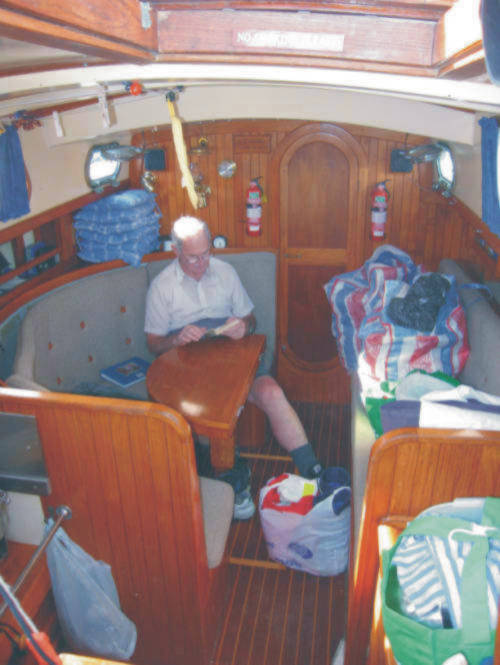 Bill is simply seasick proof
Bill is simply seasick proof |
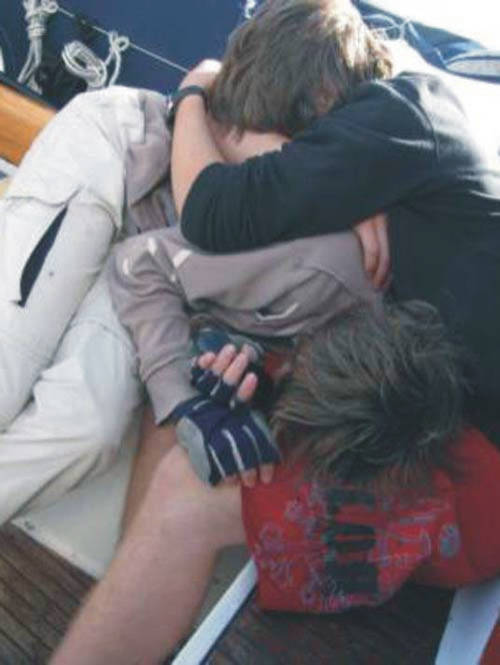
James & Matt getting their
sea legs? |
Destination Refuge Cove
My enthusiastic exclamations about Joshua Slocum and Sir Francis
Chichester having both sailed in these parts, kind of lacked
currency with my audience, however, this did not include my father
I must say, who has a prodigious appetite and memory for dates,
times and most things historical.
The Wilson's Promontory lighthouse was rounded at 18:00 hours
and our goal of a daylight arrival at Refuge Cove achieved an
hour later. We'd travelled 175 km in around 13 ½ hours,
an average of more than 7kts. After a queasy start, Evan slowly
began showing signs of life and to his credit, battled through
to gain his sea legs, as we all soaked in the glassy stillness
of this so appropriately named destination.
For two days we swam, relaxed, walked and explored Refuge Cove
before heading north to Port Welshpool on Friday 30th December.
The weather got sunnier and warmer, but more importantly, the
wind kept blowing our way, as we made the six hour hop up the
coast with slack sheets and a generous bow wake. There was even
time for a (solar) shower on deck as the plastic bag with hose
and spray-nozzle was hoisted up the rigging and hair shampoo
liberally dished out.
The multi-hooked lure, towed astern, netted 4 large fish and
so dinner this night was definitely not coming out of a can.
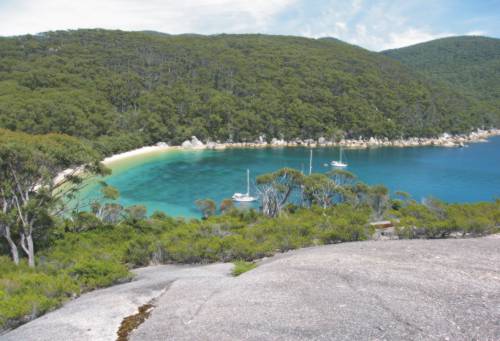 |
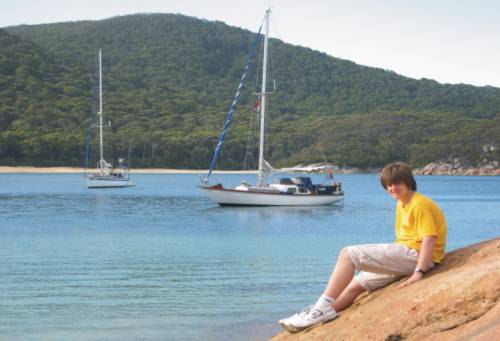 Refuge
Cove pictured left and right...a precious anchorage after a tough
passage
Refuge
Cove pictured left and right...a precious anchorage after a tough
passage |
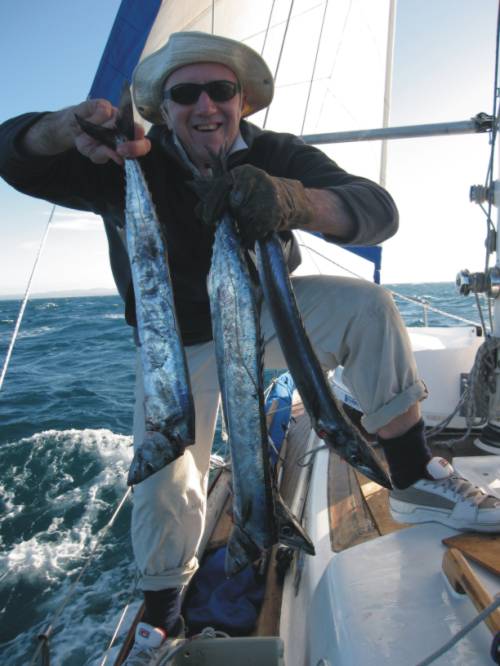 Robert
gets the fish!
Robert
gets the fish! |
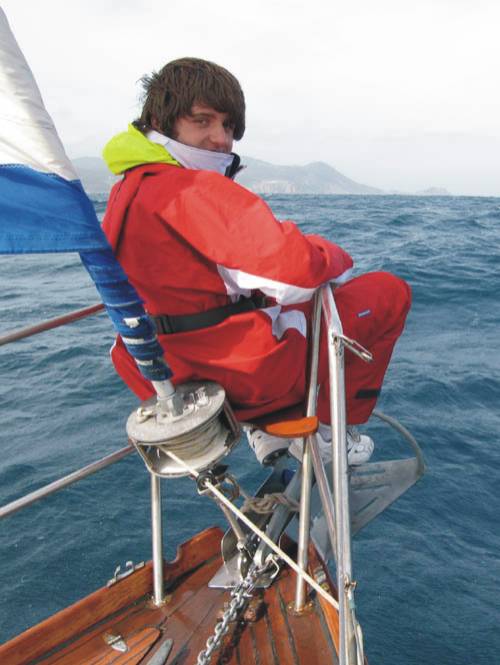 James taking a pulpit
ride
James taking a pulpit
ride |
|
|
New Years Eve
Our decision to tie up at the Port Welshpool wharf for New Years
eve was partly to appease the boys' desire to catch up with a
few of their mates and partly to allow crew members to exit should
the first leg of the journey turn out to be "beyond their
expectations".
As it turned out, everyone aboard was eager to press on for a
further two weeks, and the New Years eve party took the form
of a (paying) jazz gig I'd organised with the Port Welshpool
Hotel two weeks earlier. The logistics of the gig involved my
wife, Linda, driving down from Melbourne with the band gear along
with an entourage of young musicians and assorted other family
members and supporters. The evening's line-up saw Matt and James
playing Celtic violin music and then jazz with four of their
mates, to the delight of all the gathered (and increasingly intoxicated)
revellers. It was a memorable night, made even more so by the
fact that I didn't have to prepare the meal onboard using our
two burner metho stove!!
The New Year saw us back on board Tee Pee around 1:30am with
a steady easterly breeze acting to keep us off the wharf. Somehow
the peace and tranquillity all seemed too good to be true.
It was around 4:00am that the change came though. First, as a
searing hot northerly wind at 25kts; a wind that left no doubt
as to its inland desert source. Then, as a cold westerly wind
of similar strength, accompanied by horizontal rain. The pounding
against the wharf started almost immediately as the ripples of
the small, pier-enclosed harbour built into fully-fledged waves
in a matter of minutes.
"All hands on deck!!". I love saying that. It's even
better when the crew actually respond. This time they did, with
the immediate task being to hold the starboard side of our beloved
Tee Pee away from the wharf while I arranged a long line from
the portside to further down the pier, in an effort to keep us
off. Our impromptu, nocturnal exercise complete, it was then
back to bed, snug inside while the rain and cold beat down.
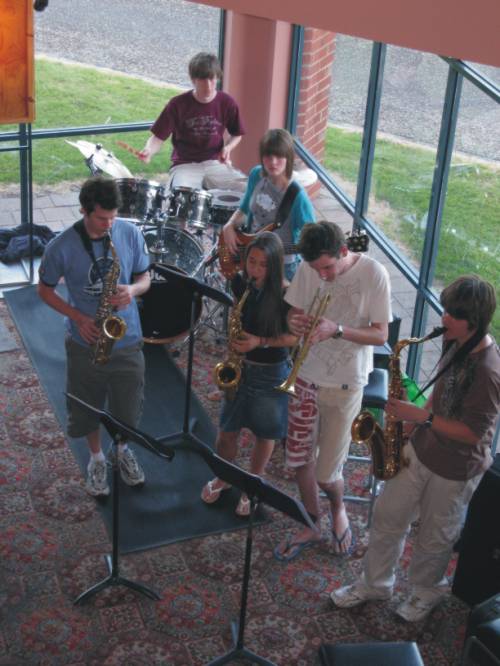 "THE BAND"
"THE BAND" |
|
|
Departure Delayed
The gale warning and rain persisted all day, so it was agreed
that our departure would be delayed until the following morning,
Monday 2nd January 2006. The morning arrived soon enough and
after heading away from the wharf and clearing the channel on
the outgoing tide we laid a course south to Deal Island, part
of the beautifully remote Kent Group.
Good progress was made under double reefed main and a 50% jib,
with the 11 hour jaunt seeing us at anchor in West Cove by 6:00pm.
In keeping with the coastal forecast, the wind strengthened from
the west at around 30kts, although gusts from the nearby hills
and the seaspray it raised, exceeded this at times, causing us
to repeatedly circle on our anchor. Normally a source of anxiety,
as the anchor sets and re-sets itself, I was comforted in the
knowledge that my over-sized anchor, (capable of holding an 11
ton boat) and generous supply of chain, would hold me fast.
Psssst … Like A
Loan Of An Anchor?
Not so tranquil were the husband and wife team aboard a 40 foot
yacht, with whom we shared this remote and wind-swept bay. As
light began to fade and numerous attempts at anchor-setting proved
unsuccessful, it became clear that their, (grossly under-sized)
anchor was not going to do its job.
As anyone who has pitched a tent in public, or made a difficult
and obscure purchase in a hardware store without asking for assistance
will know, setting an anchor is a very private matter. Whilst
everyone within a 1000 yard radius, (and no doubt many on shore
as well), will have an opinion, very few are brazened enough
to proffer advice. "Have you tried …?", "Maybe
a bit over there … ?" "You might be a bit close
…" or "Are you letting out enough rope (sorry,
warp) …". No, few will raise their head, let along
their voice, but it's amazing what can be gleaned at close quarters
out of the corner of ones eye!!
Finally, to quote Popeye The Sailor Man, "I could stands
it no more". Knowing the skipper from our marina back at
Westernport and feeling for his wife who was bravely making her
first foray beyond home waters, I called out whether he'd like
a lend of my reserve anchor. In accepting my offer, I sensed
his relief as we set about transferring my, (neatly stowed away
and brand new) 25kg admiralty anchor, along with chain and rope
to his foredeck. While tied up astern, I resisted the temptation
to ask why it was he had little more than a picnic anchor between
him, his beautiful 9 ton yacht and the rocky headland not more
than 200 metres astern.
The Magic of the Kent
Group
The next 2 days we remained within the Kent Group, transferring
first to Garden Cove in an effort to seek greater shelter from
the increasing westerly gale and then back to East Cove on Deal
Island, in order to explore ashore once the weather system had
finally blown itself out.
A walk to the historic lighthouse atop a steep, granite hill
of 1000 feet, saw us battling to re-gain our land-legs, as the
whitewashed buildings of an earlier age were inspected and the
wildlife of mostly (tame) wallabies and Cape Barren geese were
photographed. Built in 1848 by some early English migrants, (affectionately
known as convicts) the lighthouse claims to be one of the highest
in the world. So high is the structure in fact, that its effectiveness
was sometimes reduced on account of being above the clouds.
Today, it's inoperative as a lighthouse and maintained as a museum
by enthusiastic volunteers who vie for the privilege of acting
as island caretakers for three-month stints. During our brief
visit, there was a husband and wife team in charge, with our
friendly chat revealing that the usual day job of "husband
Tony" was as one of the chiefs in the Victoria Police air-wing.
Certainly remote Kent Group would have been a change of pace.
Onward And Southward
Turning our back on The Kent Group, the afternoon of Wednesday
4th January saw us complete the six hour hop further south, where
we made landfall for the night at Palana on the northern tip
of Flinders island; the main island making up the 50 plus islands
of the Furneaux Group.
An early departure the next morning enabled us to work our way
down the west cost of the 64km long island to our anchorage for
the night, Badger Island. We never did find out why the island
was so named; given that there are no Badgers in Australia. Possibly
it was the result of some 19th century, homesick naval captain
with a love and yearning for the English countryside.
The port town of Lady Barron, at the southern end of Flinders
Island, was reached on the afternoon of Friday 6th of January.
A goal achieved after carefully following the published sailing
instructions, in order to avoid the numerous sandbanks and submerged
rocks that lie within the boundaries of Franklin Sound; the stretch
of water that separates Flinders from Cape Barren Island.
Whilst we avoided shallow water and hard objects, one thing we
did not avoid was the ferocious tide, which passes close to the
southern edged of another imaginatively named piece of ground,
Great Dog Island. Thinking I was clever to be arriving on the
incoming tide I soon discovered that the flood tide runs east
to west in these parts, NOT west to east. The result of this
miscalculation was that for 90% of the journey up Franklin Sound
the tide ran against us, reaching a maximum speed of over 5 knots
near the entrance to the Tasman Sea and the Vansittart Shoals.
It was times like this that I gave thanks for my new Yanmar 30hp
engine, which at a touch over 2800 rpm could still keep us moving
at 1.5kts.
A Car For The Day
From a chance discussion a few weeks earlier at a pre-Christmas
function the name of a local resident was obtained; the classic
"friend of a friend". As chance would have it, she
was home when I called and kindly offered us a car for the day
so that we might "explore the island"; an offer we
gladly accepted.
Apart from enjoying a different perspective of the place, we
also discovered that the island ranks as probably the "road-kill"
capital of Australia with a ball of dead fur, (mostly wallabies)
on the side, or middle of the road, roughly every 300-500 metres.
(No references to rugby and dead Wallabys please).
Surrounded by fishing boats and a couple of yachts returning
from the Sydney-Hobart race, we enjoyed our two nights, nestled
against the wharf, in the sleepy outpost of Lady Barron.
Tamar River Here We
Come
Having learnt our lesson about the tides and with the immanent
arrival of easterly winds, it was time to plan our homeward course;
a strategy that had us away from the wharf the next morning at
04:00 with a generous following wind and tide - destination,
George Town.
In his book, Sailing Alone Around The World, Joshua Slocum speaks
of his enjoyable stay at George Town and surrounds, including
the Tamar River and Launceston.
For us, the stay was no less pleasant, particularly after the
17 hour sail from Lady Barron. A trip included our first experience
with sea fog, two hours of being totally becalmed, followed by
seven hours of reefed-down, pole-out excitement before a brisk
easterly gale.
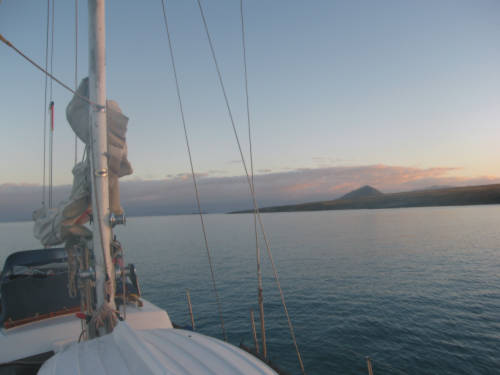 Becalmed to gale...Evan
meditates...
Becalmed to gale...Evan
meditates... |
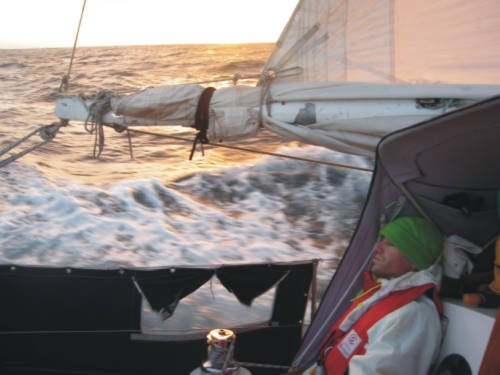 |
Tranquil George Town
The red clouds from the setting sun were fading in the west as
we made ourselves secure against the George Town public pontoon.
A modern facility, built to serve the comings and going of small
craft while at the same time address the problems caused by a
3 metre tidal fluctuation.
Whilst the sign said "Maximum 3 Hour Stay" the ever-helpful,
elderly radio operator of the local sea rescue service, (whom
we had got to know quite well over the preceding week from regular
VHF weather forecasts and two-way communication) assured us in
his distinctive (Welsh) accent, "Oh, don't you worry about
that. I keep telling the harbour master that visiting boats need
time to recuperate and it's unsafe to move them on after just
3 hours".
Needless to say, we took him at his word and after three day's
we were ready to embark on the last homeward leg; a 28 hour,
300km, north westerly hop across what is affectionately known
as "The Paddock".
Homeward Bound
True to form, the wind remained changeable, with the brisk southerly
of the morning, giving way to an easterly and then north easterly
by afternoon. This was followed up with a northwesterly on-the-nose
in the early hours of the morning, which, after dying away veered
westerly, then south westerly at reasonable strength as we made
the final Westernport approach. Again, thanks go to the "iron
headsail" and some reserve diesel, for enabling us to keep
the quayside appointment with family and friends who had kindly
driven down to welcome us home.
An Amazing Experience
In reflecting on the safe completion of our adventure, we have
much for which to be thankful. The weather for a start was not
as bad as it sometimes is, but more importantly, we learned a
great deal about each other, our capabilities and ourselves;
particularly beyond the comfort of our familiar suburban surroundings.
For those interested in discovering more about this wonderful
region of Bass Strait, a simple Web search using a few of the
key words in this article, will reveal a mountain of fascinating
information. As for me, I'm already planning the next cruise
which is likely to focus on the eastern entrance to Bass Strait,
including King Island and northwest Tasmania.
Good Sailing!
More excellent
photos:
|
The 17 day trip around Bass Strait
included my 2 sons, 78 year old father and a friend Evan, who
produced a very high quality DVD of the voyage. If you're interested
you can view the trailer for the movie at the following link.
http://www.menogue.com/evan/grabbag/bass-strait/
The DVD is available for sale, ($25/copy) with all proceeds going
to 3 overseas aid projects which our Nth Ringwood Uniting Church
are directly partnering, namely a vocational training college
extension in Ndola Zambia (teaching 2yr diplomas in bricklaying,
building and sewing), a children's drop-in centre in Cambodia
called The Sushine Centre for working, mostly orphan kids in
the 5-15 age bracket, and a health worker we are employing in
Nth Thailand.
click here for order form
|
|


